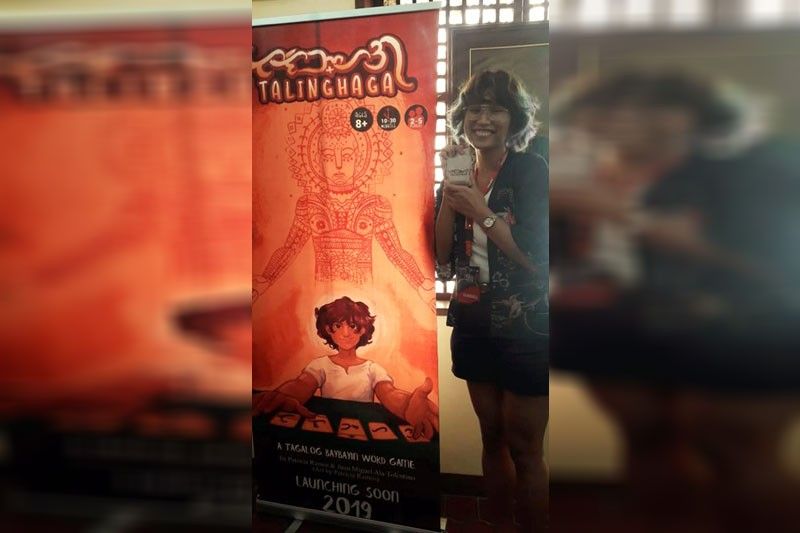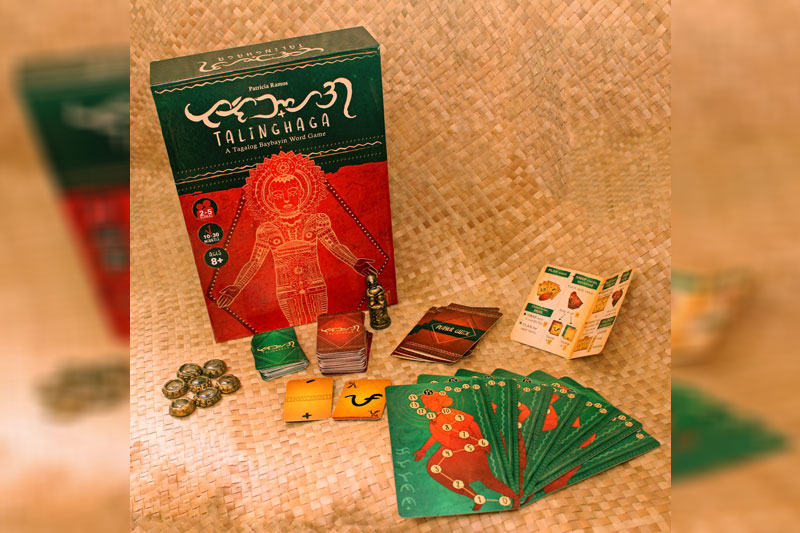Every word counts

Freelance artist and art teacher Patricia Ramos is making every word count with her game Talinghaga, which aims to teach players the indigenous script Baybayin.
The card game started as Ramos’ undergraduate thesis in 2017 as a Visual Communication major at UP-Diliman.
Baybayin was one of the topics she wanted to take up in her thesis and she originally was considering creating a workbook or an app on the topic. The idea eventually evolved into a card game.
“I got more into board games when my co-designer Juan Miguel Tolentino and I used to go to boardgame cafés,” Ramos shares. She enjoyed the fun and immersive experiences that boardgames offered and thought it would be a good idea to use gaming to teach Baybayin.
She especially enjoyed the tangible and tactile process of playing with cards and also notes that there are already several Baybayin apps available.
As an art major, she enjoyed designing the cards and even had clay figurines in the original version.

“I also saw the value of learning through something that is not digital,” says Ramos. “It’s very good that technology is being integrated into education now, but I think we also have so much potential with all the material that we can use for kids to learn through stuff like boardgames or even physical activities or hands-on art activities. Let’s give their tablets a break for a bit.”
Talinghaga is a word-building game with each card printed with Baybayin syllables and their Roman letter equivalent on one side and a kudlit or sabat on the other side.
The kudlit changes the syllable’s vowel depending where it is placed on the syllable (from ba to be/bi or bo/bu, for example), while the sabat, a little cross or x-mark, cancels the vowel sound completely.
The Scrabble-like game has players spelling out words on their turn. They can also “steal” by adding syllables to their opponent’s collection of words or add on to their own words on the table.
Punta can become pupunta, then pupuntahan, for example. Bulak can be stolen to become bulaklak.
“One of the things that I really like about Tagalog is that by adding a single syllable, you can change the whole word completely,” says Ramos. This unique aspect of the language is highlighted in the game.
After a set number of rounds, the player with the highest points wins. Ramos says there are also players who adapt the rules for solo playing.
It is a simple game, “but the challenge is in knowing words that you can spell out,” she says. “I hope it will up the appreciation for the Tagalog language.” She hopes that competitive players will be moved to beef up their Tagalog vocabulary so they can score higher points.
After several play tests, Ramos and Tolentino were able to fine tune the gameplay. Last year, Talinghaga was picked up by Game Detective, a boardgame specialist and distributor. Talinghaga is Game Detective’s first foray into publishing an original game, says Ramos.
Adapting her game for mass production was another challenge.
They had to make the cards smaller so they wouldn’t occupy the whole table during game play.
They replaced the handcrafted clay figurines with much simpler components.
While her thesis output was housed in a big box, the current version of Talinghaga fits conveniently in a small cloth pouch.
“I don’t regret it because it’s more portable now,” she says, noting that now players can take the game anywhere.
As for Ramos, her dream is to take the game to even farther places, especially schools. In fact, for every purchase, another game set is donated to a public school. “We’re trying to collect enough to donate to several public schools,” she says.
For the young game designer, learning to write Baybayin and the current trend of using the script calligraphy in contemporary designs is just the first step.
“The real goal is to encourage people to find ways to be more nationalistic or to find more pride in the Philippines.”
She hopes that Talinghaga will inspire players to learn more about Baybayin. Then they may discover that there’s not just one indigenous script but 18 different scripts, each suited for a different language across the Philippine regions. Ramos says ideas for expansion packs with these other scripts could be in the works if the first print run of Talinghaga does well.
She also dreams of reaching out to more and more students through school tours and hopefully tap into the Fil-Am, OFW and millennial immigrant communities who want to get back in touch with their roots.
“Knowing the roots of your culture and the secrets of your culture that you didn’t learn in school, hopefully also motivates you to learn more about the people behind the culture and the issues they are struggling with.”
Ramos says: “Through learning about Baybayin I want to help the indigenous people. I am proud of my culture and I want it to stay alive, so I will protect the people who make that culture a reality in the first place.”
She adds, “A country’s development should be in sync with its culture and how they value their heritage. I want to see Filipinos proud of their national history and culture.”
Though Talinghaga is a game, its noble aspirations for its players and the nation are worth taking seriously.
To order Talinghaga, visit www.thegamedetective.com/products/talinghaga.
- Latest
- Trending














